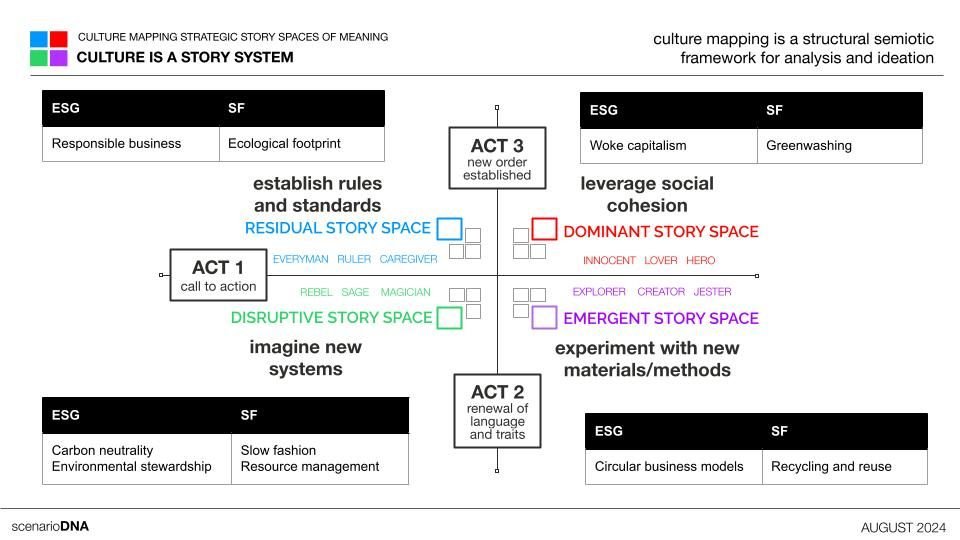Image: Midjourney
ESG and Sustainable Fashion struggle to align with broader societal values
ESG and sustainable fashion are grappling to align with broader societal values. Culture mapping can play a crucial role here starting with an analysis of the language within the storytelling.
The conversation surrounding ESG highlights the backlash and politicization of the term, with critics often labeling it as "woke capitalism" (Heimann & Garber, 2024). Sustainable fashion, on the other hand, directly addresses environmental concerns by promoting responsible production and consumption patterns within the fashion industry—a sector notorious for its significant ecological footprint.
"It took me a while to realize that what I had been doing in fashion was primarily storytelling,” Indré Rockefeller told the Washington Post in “Can fashion ever have a conscience?“
As cultural norms and values evolve, culture mapping provides ongoing insights that would help ESG and SF stay relevant, as opposed to the backpedaling and skepticism we are seeing today.
A literature review on SF marketing (Ray & Nayak, 2023) underscores the importance of authentic communication and the avoidance of greenwashing, echoing the broader calls for transparency and accountability seen in ESG discussions. Both SF and ESG seek to redefine business success not solely in financial terms but in terms of positive social and environmental impact.
“There’s a whole body of research pointing to climate tipping points and cascading risks that warn that business-as-usual will lead to devastating outcomes,” explained Maurits Dolmans of Cleary Gottlieb in a Bloomberg interview titled "‘Toxic’ Attacks on ESG.”
A noteworthy parallel between ESG and SF is the shift away from divisive terminology. Yet, the language changes reflect a conservatism that will further hold initiatives back. Just as some companies are opting to replace "ESG" with terms like "responsible business," SF brands are encouraged to clearly communicate their sustainability commitments to overcome consumer skepticism.
“The only way to solve this is to align the interests of companies with what we as humans and societies want,” emphasized Colin Mayer at the University of Oxford for "What does AI mean for a responsible business?" in the Financial Times.
Yet, “responsible business” is the waning language of “everyman.” Creator spaces that shape emergent, not residual, language are essential to move ESG and SF forward out of their disruptive origins. There is no room to convey evolution and innovation within residual language. Let alone leverage imagination.
ESG and SF both promote the circular economy, focusing respectively on resource management & stewardship and recycling & reuse. This is the language to evolve.
Heimann & Garber, Reuters, July 9, 2024. https://reut.rs/47igDhQ
Marsh, Bloomberg, Jan 18, 2024 https://bit.ly/4dPf1yq
Murray, Financial Times, Mar 27, 2024 https://on.ft.com/3XgP9nY
Ray & Nayak, Sustainability, 2023. https://bit.ly/4g9jRrV
Tashjian, Washington Post, Sep 3, 2024. https://wapo.st/4dN8AMo




